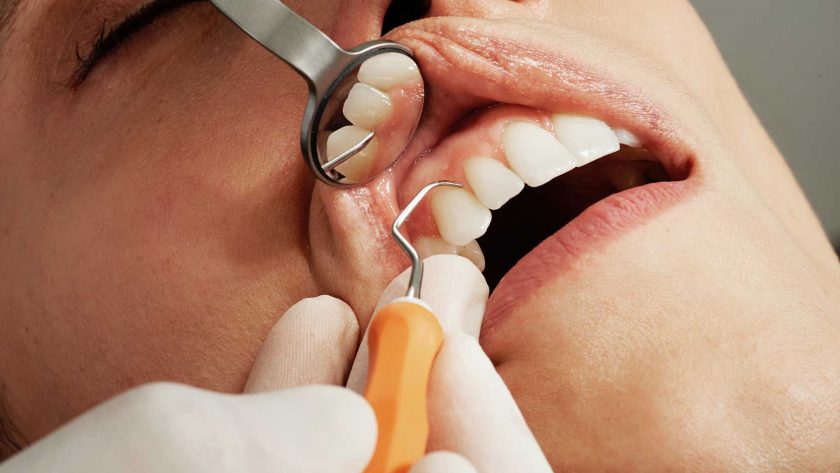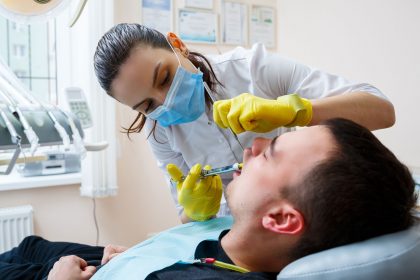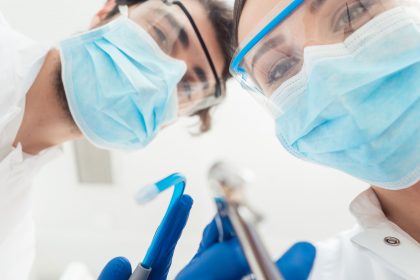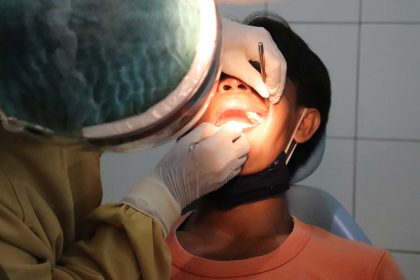I’ll never stop talking about how important it is that you brush your teeth and floss and practice overall excellent oral hygiene. But I also have to admit that it’s not enough. No matter how good you think you are at keeping your teeth and gums spick-and-span and free of crud and plaque, you’re still going to need a pro to tackle your pearly whites every now and then. It’s like the difference between running your car through a drive-through wash versus having it professionally detailed.
You should have your teeth cleaned by a dentist or dental hygienist at least once per year. People at higher risk of cavities and gum disease should get their teeth cleaned more frequently. Follow your dentist’s advice if they suggest your teeth should be cleaned professionally two, three, or four times per year.
The official recommendation from the American Dental Association is that you should have “regular” dental visits at “intervals determined by your dentist.” That might sound vague, but it’s for a good reason: every mouth is unique. Your dentist knows best when it comes to all the factors that make your mouth more or less prone to cavities and disease, and therefore more or less in need of cleanings.
What is the purpose of a professional cleaning?
You should brush your teeth at least twice a day, for at least two minutes each time, and floss once a day. This is the standard recommendation for preventing dental plaque from settling onto the teeth and beginning the process of causing cavities and gum disease.
But despite our best efforts, some plaque is going to get by us. It’s going to settle in hard-to-reach spaces between the teeth or beneath the gums. We’re not going to notice it until it’s too late to disrupt with a simple brush or floss.
That’s why we visit the dentist or dental hygienist. Their trained hands and professional instruments can make quick work of any tartar buildup. When we make regular visits to the dentist for these detailed cleanings, the tartar doesn’t stand a chance — and we add many happy, healthy, pain-free years to the lifespan of our teeth.
Risk factors suggest the need for more frequent dental cleanings
Many dental patients will see sufficient benefit from one cleaning per year. These would be patients who already practice excellent oral hygiene and who have no added risk factors. But some risk factors indicate a need for multiple cleanings during the year:
Smoking — Short of never cleaning your teeth at all, smoking is one of the worst things you can do for your oral health. Smoking just wrecks your mouth. Setting aside the oral cancer, the discoloration, and the bad breath, smoking increases the buildup of plaque and tartar, which increases the risk of gum disease, cavities, bone loss, and a lot more. So if you’re a smoker (or a toker) be sure to add in those extra professional cleanings. Your dentist will tell you how many you need per year. Also, stop smoking.
Diabetes — Diabetes can be part of a vicious circle when it comes to oral health. Not only does diabetes make you more prone to problems with your teeth and gums, but poor oral health can actually contribute to your diabetes. Frequent teeth cleanings are important for diabetics to help avoid and control periodontitis. Controlling periodontitis will have the fortunate side effect of helping to control diabetes.
Genetics — Certain genetic conditions can make a person more prone to oral health problems. If there’s a history of poor oral health in your family, be sure to let your dentist know. You may need to be more diligent in your own oral care routine, including multiple professional cleanings each year.
These are major risk factors that will lead to a need for more frequent cleanings. But there are other things that could also increase your risk:
- Neglectful oral care such as not regularly and thoroughly brushing your teeth, or if your use of dental floss is sporadic on nonexistent.
- You have “dry mouth” or you’re taking medications that cause dry mouth.
- You wear dentures, braces, or some other appliance in your mouth.
- You eat a lot of sugary treats.
- You’re not exposed to fluoride in your drinking water or toothpaste.
- You have a history of cavities, gingivitis, or periodontitis.
- You are pregnant.
- You have any other chronic medical conditions linked to oral health.
How often should you get your teeth professionally cleaned?
If you’re free of all the issues discussed above, then you can probably get by with one dental visit and cleaning per year. But if it’s been more than a year since your last dental checkup, then it’s time to make your next appointment. Your dentist will give you a thorough examination and recommend a schedule for future cleanings based on your specific needs.




